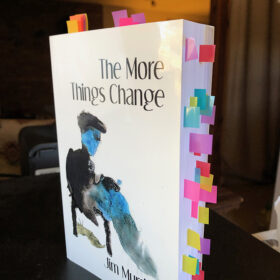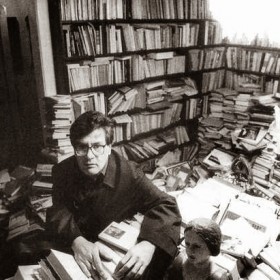-

My Pandemic Year in Books
So Many Books, So Little Time I could have sworn that I’d read far fewer books this year than in past years, but it seems not to be so. It must be one of the few benign side effects of the pandemic. Of course, the pandemic has been hard on my writing, poems—at least poems of my kind—seeming fairly pointless amid the waves of infection and death and the tide of fascism rising out of the GOP (the Goosestepping Old Party).Read More
-

Adios, Galway Kinnell
Galway Kinnell Galway Kinnell, who died on Tuesday, was perhaps the second or third living poet I ever met. He had been invited to read at the University of Northern Colorado, where I was a student. I was 20. I had already witnessed the deep, wild energies of Robert Bly in performance, but based on reading Kinnell’s Body Rags I knew not to expect that kind of splash. And Kinnell’s wildness did prove to be of a quieter kind. His sensibility was resolutely earthbound, images were tactile, the the music thick and twisty like a Celtic knot. He did not stimulate; he involved.Read More
-

On Vitality…
David Mason I generally don’t care for omnibus reviews. They too often display what Seamus Heaney called a “faults-on-both-sides tact,” and as a result one doesn’t get a point of view so much as ad hoc approval or condemnation, often enough with less than half a dozen lines quoted from any of the books because the reviewer is so anxious to demonstrate his or her own prowess with words. Of course, that “generally” in my first sentence begs the question of particulars.Read More
-

Adios, José Emilio Pacheco
José Emilio Pacheco—poet, writer,essayist, and translator—in his library. A few days ago I heard from Angela Mairead Coid, wife of my poetic mentor George McWhirter, that on Friday, January 24, the Mexican literary giant José Emilio Pacheco had fallen and struck his head, but appeared to be in no pain; he could not be awakened the next day, however, and passed away the day after—Sunday—from cardiac arrest. Pacheco was 74.Read More
-

Immodestly Noted
Order on Amazon Succinct The Broadstone Anthology of Short Poems edited by Jonathan Greene and Robert West Broadstone Books 418 Ann Street Frankfort, Kentucky 40601-1929 My contributor’s copies came in the mail yesterday, and oh my—what are the odds that an off-the-main-map poet like me would find himself among such company? Somewhere between Anonymous and Zukofsky, within hailing distance of Archilochus, Arnold, Brandi, Bunting, Heaney, Kinnell, Niedecker, Rosenow, Villon, three Williamses (Jonathan, Miller, and William Carlos), and yes, Willie Yeats. This gave me a strange sense of elation, enhanced by the beauty of the physical book itself.Read More
-

Oversight and Congratulations
Although James Stotts has been a follower of this blog for quite a while, I somehow missed the fact that he has a fine blog of his own, The Fugue Aesthetics of J. H. Stotts, which I’ve added to the Recommended Links list. I especially want to note his post today about the debut of “a new journal of poetry and prose” named Little Star.Read More
-

Honoring Ted Hughes
There’s a move underway to honor the great Ted Hughes in Poet’s Corner, and I for one can only applaud the idea. He was certainly, as Simon Armitage writes, “a genius with an unparalleled gift, a once-in-a-generation poet whose work was a major contribution to English literature.” Leading the effort, apparently, is the Nobel Prize winning Irish poet Seamus Heaney, and his effort strikes me as an act of great friendship and humility. Heaney is a fine poet, but his work doesn’t match Hughes’s in power, range, and sheer adventurousness.Read More
-

Reading Into and the Avant-Garde
Jacket Magazine has published a peculiarly passive-aggressive 4,000-plus word response by Jeffrey Side to a 193 word statement by Seamus Heaney, quoted from Heaney’s interview with Dennis O’Driscoll as published in Stepping Stones: Interviews with Seamus Heaney. (The interview is no longer available online, alas.) Here is the Heaney excerpt; his initial “it” refers to the term “avant-garde”: It’s an old-fashioned term by now. In literature, nobody can cause bother any more. John Ashbery was a kind of avant-garde poet certainly and now he’s become a mainstream voice.Read More
-

Thingyness
Here’s an imaginal excerpt from a wonderful, long profile by Robert McCrum of the great Irish poet Seamus Heaney. It’s Heaney’s response to McCrum’s question (the most common question asked of every poet, I think): “Where does poetry come from?” “I think it comes from all the other poetry that’s there,” [Heaney] replies.Read More

 Joseph Hutchison, Colorado Poet Laureate 2014-2019, has published 20 collections of poems and edited or co-edited three poetry anthologies. He currently directs two master’s-level programs for University College at the University of Denver: Professional Creative Writing and Arts & Culture Management. Joe lives with his wife, Melody Madonna, in the mountains southwest of Denver, Colorado, the city where he was born.
Joseph Hutchison, Colorado Poet Laureate 2014-2019, has published 20 collections of poems and edited or co-edited three poetry anthologies. He currently directs two master’s-level programs for University College at the University of Denver: Professional Creative Writing and Arts & Culture Management. Joe lives with his wife, Melody Madonna, in the mountains southwest of Denver, Colorado, the city where he was born. 









